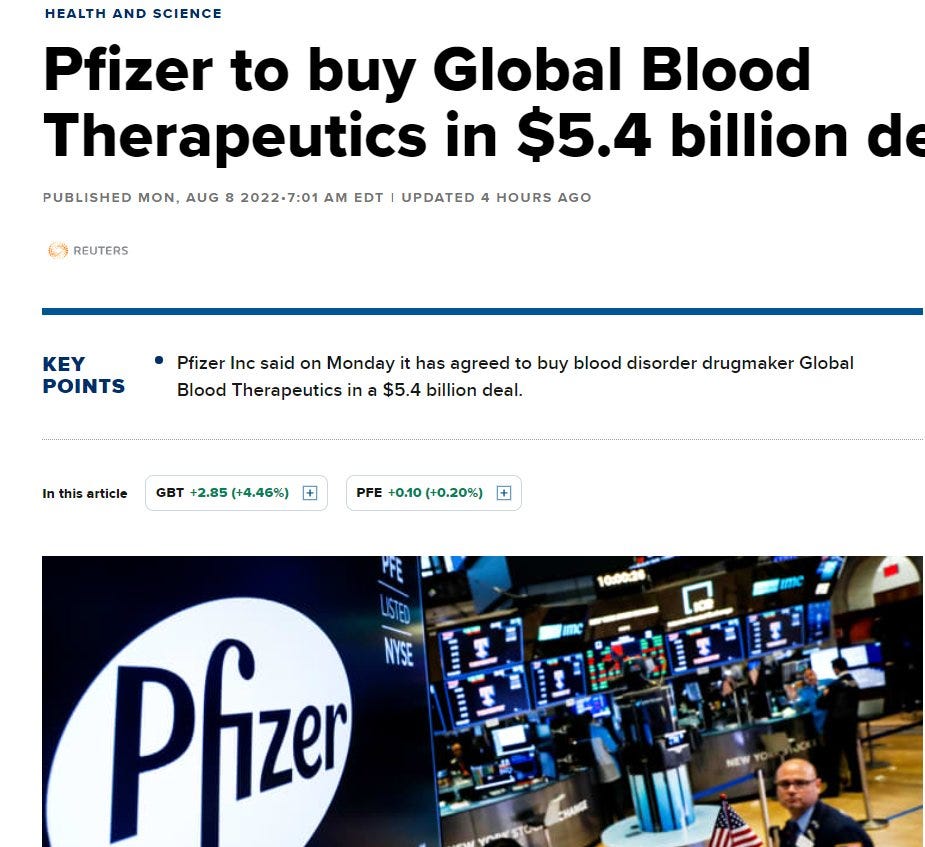In 2021, during our deep research, my friend (whom I often mention in my Substacks) and I encountered puzzling dynamics. We quickly realized that mRNA, as a universal treatment, had limitations due to numerous missing details, individual variations, and the complexity of addressing intricate aspects. This led us to constantly question ourselves: "
”How do you fix such a biological mess ? And what is the end goal ?”
The first answer was so straightforward and simple, almost too straightforward to accept. The solution involved conducting large-scale tests with various compositions of the product, meticulously gathering data, and utilizing algorithms and AI to analyze and resolve any issues. Although biology does not always follow a linear path, this approach promised significant progress, compressing decades of research into a mere two years. It is now evident that this is precisely what both Moderna and Pfizer accomplished. Notably, besides the questionable claims of protection, their ability to track each vaccine administration globally became a key selling point to governments. Data truly is modern gold.
The second aspect, from a purely scientific perspective, appeared “good” as it facilitated rapid advancements and addressed seemingly unsolvable problems. From a human perspective, nefarious. Said friend came to a sobering conclusion of that end goal.
Personalized treatments for every single person.
This outcome would grant immense power and control over vast portions of the global population to pharmaceutical companies and governments alike. Furthermore, it is worth noting the acquisitions made by Pfizer and Moderna, which I will touch upon to emphasize my point.
Moderna is buying Japanese DNA supplier OriCiro Genomics K.K. for $85 million, the U.S. company’s first acquisition since launching in 2010. It’s not the major splash that some may have expected, or even hoped for, but in many ways it fits the tea leaves executives had teased all last year.
These are just a few examples to highlight my point of data gathering, and everything else mentioned. With abundant data or signals, and a system to make sense of it (analytical or otherwise), you can make “safe bets” towards acquisitions and merges of business that will catapult your earning solely based on demand. Regarding the second point…
In what could be a 'big shift' for cancer treatment, mRNA vaccine shows promise against melanoma
If the results of a recent study hold up, it will mark a dramatic turnaround for cancer vaccines, which have been tested and failed for decades.
The vaccine technology America learned about during the pandemic was originally aimed at cancer, but its use against infectious diseases took off in the pandemic. Now a new study suggests specially designed mRNA shots can help prevent recurrences of melanoma, a dreaded skin cancer.
The study, presented Sunday at a research conference, showed that after nearly two years, patients who received a personalized mRNA vaccine made by Moderna and Merck were 44% more likely to be alive and avoid new tumors than those who received only the standard of care.
If the results hold up in a larger, longer study planned to start later this year, it will mark a dramatic turnaround for cancer vaccines, which have been tested and failed for decades.
"It's probably the first real data that suggests that this personalized approach to vaccination may be worth exploring further," said Dr. Ryan Sullivan, an oncologist at Mass General Cancer Center, who was a co-author on the study.
Instead of using a vaccine to try to prevent or shrink a tumor, the new mRNA vaccines are aimed at reducing the chances of a high-risk cancer recurring.
"This represents a big shift in how we're using cancer vaccines," said Dr. Robert Vonderheide, who was not involved in the study but is the program committee chair of the American Association for Cancer Research's annual meeting, where the study was presented.
I will refrain from commenting on the obvious problems of using personalized mRNA such as manufacturing tailored therapeutics, logistics, and the high costs entailed in the endeavor, most likely leading governments and healthcare companies will bear the brunt of it, placing additional strain on the entire system and subsequently driving up costs for individuals in need of these treatments.
Trials for personalized mRNA treatments are already underway, all small scale with results such as the one above, where only half or fewer patients achieved success and they all were treated with a monoclonal antibody beforehand, a style of treatment that on its own has already significant drawbacks and adverse effects making it important to critically assess the combined approach, mRNA by itself has the capacity to “rewire” the immune system to response very differently to certain types of pathogens, thus making the use of monoclonals “tricky”.
The caveat with these mRNA and monoclonals are both the same, neither is long-lasting with a short duration of effectiveness, and both are antibody-based therapies with different approaches to producing and eliciting an immune response. Monoclonals wane after months, and mRNA antibodies wane after months. Besides all the safety issues, this assures lifelong customers, either they get the treatments to keep the disease at bay, or it comes back (most likely with a vengeance).
These treatments have benefits, and many people will certainly need them, but I felt the need to bring these other aspects to attention. And given its smaller scale, personalized nature the problem is serious since safety signals and adverse reactions won’t show themselves, especially at the scale it did with the SARS-CoV-2 mRNA (but the protein chosen in that one bears half of the fault, at the very least).
Fun fact, DARPA themselves called mRNA a “gene-encoded antibody” therapy back in 2019.
The cold reality of a world where ethics take a backseat and the bottom line reigns supreme.
If you chose to support this substack or shared this Substack, thank you, appreciate the support.












Vaccination is an organized criminal enterprise dressed up as disease prevention by means of junk science.
(Can't remember who said)
Or just like viruses do, the cancer evolves to evade the antibodies and it stops working. Unless the antibodies somehow also kill off the cancer stem cells that are often times the cause of recurrent cancers after remission.
I don’t blame Pharma on this one. They find treatments to keep people alive they should make those products, IF the market value is affordable to the payer both short and long term.
Are they treating the cancer with a band aid or are they hitting the root cause and a true cure? With Pharma it’s usually the band aid approach that keeps the $$ flowing.